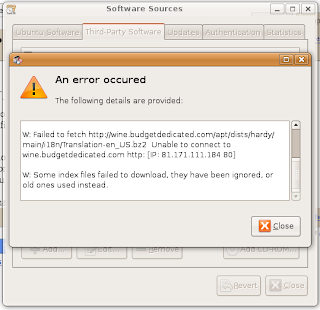Well, apparently my little rants have attracted the attention of a Wine supporter. I will now address his remarks made in the
comments section of my last post.
Sorry to say did you value the cost of the Platinum list. If you had you would know that its more than the total worth of code weavers.
Okay, I can accept that. CodeWeavers does look like a small company (although browsing their website, I could not find any information about their total worth). However, are they worth more than the total worth of CodeWeavers + Red Hat + Novell + Canonical + International Business Machines + Sun Microsystems (who would probably be interested in Windows compatibility for Solaris) + Apple (ditto)? If only the major Linux distributions became serious about Windows compatibility, they could probably scrounge up a lot of that list and more. However, they may not be interested for reasons listed below. I do not know if Codeweavers has tried to do this, but maybe CodeWeavers should approach the major software studios (game companies, CAD companies, etc.), and ask for copies of their software to test against Wine releases. Loki achieved some success with this, and they were asking for source code, which is a hell of a lot more high profile than an install disc. The software companies would benefit from a few extra sales, and CodeWeavers would benefit from more use of their software. The only problem is that CodeWeavers would need to be on call for support.
Standard Release binary has been on attempted a few times. Issue is distribution fragmentation.
Well, at least we agree on something.
Hopefully after LSB 4.0 is released we will be able to release a single binaries for most needed versions. Ie the set that gives you most application coverage.
Sure you will . . . I think my predecessor has covered
this issue in sufficient detail
before.
I hope you were aware that you could run more than 1 version of wine on system.
I am well aware that you can jury rig your system to install as many versions of a piece of software as your heart desires. I also am well aware that it COMPLETELY SUCKS!
Platinum ratings are per wine version. So yes a few mouths old test was still valid.
However, that version apparently worked and my version definitely does not. If 'releases' are tested, then why was my version different than the version tested? What was wrong with keeping that version? I do not care if this was a direct port of the latest Wine source code or a custom Ubuntu version. Either way, it proves a
major point Linux Hater made about the current OSS ecosystem.
Besides Wine is only a Beta status application.
What? Didn't Wine just have a 1.0 release a few months back? If Wine is still a "Beta status application", then maybe you should educate the distributions, so they will stop carrying it and instead carry the stable codebase whatever it is called. Oh, wait! It is called Crossover *, isn't it?
Yes wine gets applications working in most cases before crossover it also hits the regressions first using wine you have to accept that.
Wait, so Wine is basically an open beta for the proprietary Crossover. So, basically, if I want a program that runs Windows applications on Linux and does not break with each release, I have to pay $40+tax every 12 months and not be able to see the source code (not that I really want to, but still)? Wow! Go open source!
Seriously, this presents a major problem for Linux distros running Windows apps out of the box. If distros include Wine, they will want to advertise their ability to run *insert popular Windows application with Wine Platinum rating* out of the box, but they will not want to include an application that is known to break things with each release. However, all of the community distros will not want to include the stable version, CrossOver, because then they will have to charge $40+ for each download of their distro. Therefore, the distros have very little incentive to work on integrating support for Windows applications, and until this problem is solved, Wine users will still face all these problems.
Backward compatibility one is simple incompetents with Linux. Notice that the application was marked as working on debian 2.2. That can be chroot installed inside current distrobutions. Yes almost 100 percent backwards compatibility is doable. The dynamically linked versions of that turn out to be simpler to be got working. Chroot + a few updated .so files.
Wow, you mean I have to install an entire operating environment (I assume I do not need a new kernel) to run one application? Is there a command or included script to easily do this, because I remember chroots being a royal pain in the ass?
Guess what your so call windows working install did the same thing invisible as soon as it detected the old application.
It installed Windows 95 while I wasn't looking?
Fair test and lack of incompetence next time.
Okay, my idea of a' fair test' is "boot to operating system desktop; download binary from internet; make sure binary is not corrupted; make binary executable (Linux Only); run binary." I performed this test on Windows XP SP2 x86 and Ubuntu 8.04 AMD64.* This is what I, and most of the rest of the world, consider a 'fair' test. Linux Hater already covered
this behavior.
There is a reason why this is not automatic in Linux world. Bringing back old applications is a security risk.
Bringing back old applications is also necessary if you want to be taken seriously by enterprises. There are a lot of small, medium and large businesses that have substantial investments in old pieces of software. Many individuals also have substantial investments in old pieces of software. My grandfather still swears he has found no better piece of software for making fliers/cards/etc. than Micrografix Windows Draw. Frequently breaking backwards compatibility may work when you are play in your own little sandbox (like Apple or Freetards), but if you pull that stunt in the big leagues, you will fall flat on your face. If you do not trust an old version of Wine, you should setup the software to run in one of your handy-dandy chroots.
Source code not building you will find is gcc version yes you must use the right version of gcc for the source code. Same thing happens if you bring old MSVC code onto new MSVC at times.
Actually, what appeared to happen, is that I ran into the libpng issue he mentioned. However, his patch did not work. He was not clear what to patch. I tried it on the whole archive, and it did not seem to do anything, and I did not care enough to try to figure out what was wrong.
Should I keep on ripping.
I assume this was a question. Go right ahead; blow as much hot air as you want.
have you ever seen devices before the art people go to it.
Yes, I am sure the rough prototype of any device (even the iPhone) is not much to look at; however, after the initial device is created, the art department likely goes into high gear and releases something decent looking in short order. Three years after the Tuxphone project began, the device still looks like ass. Yes, I know the developers have halted development, thereby illustrating another problem with OSS projects. Also, if a cellphone development team even remotely follows the Standard Software Development method, it would request marketing research on visuals, ask the art department for advice, and incorporated the results into the initial requirements document. Therefore, some visuals aspects may be present from day one.
Sorry to say Tuxphone was neater than a lot of new devices.
How so? From
this presentation (PowerPoint), I get the impression that it was a mismash of OTS parts. What is so amazing about that? Any committed ECE could create a rough design for a cellphone from OTS parts in a weekend.
Ubuntu is slowing down more than any other distribution even ones with same amount of features. There are a few causes.
*John Stewart gesture* Go on . . .
One is there maintainers not skilled enough with building things.
Many Linux distros have encountered
this problem. It is endemic to
source-based distribution.
Other is a few stupid selections. Pulseaudio is about the worse Lets make every sound going out the machine cost CPU time and lets make it cost more CPU each version. That is basically Pulseaudio remove pulse it can give backup like 15% of your cpu under load compared to dmix. Yet for some reason Ubuntu does not ship with a option to simply drop back to dmix if you don't need pulseaudio's features.
Yes, everyone and their dog knows that PulseAudio is shit. Therefore, the LSB included it in the standard. Ah, the smell of progress!
Really you should not be protecting ubuntu. You are meant to hate Linux if you cannot say in char this log will sux.
Who the fuck is protecting Ubuntu? I said, "Ubuntu is getting bloated. Too bad the bloat is not making it more usable." How is that protecting Ubuntu? Also, for the record, let me clarify my position. In this blog, I will mostly hate on thing related to Linux. However, like LH, I will sometimes venture out into the wilder world and hate on things that have the copylefted luser stench.
That has been enough to effect Microsofts bottom line from them being forced to ship XP heavily discounted.
Last I heard, they were selling Windows cheap in developing countries to compete with
pirated copies of Windows.
Funny enough Ubuntu is just waking up to what Redhat and Novell has known. Redhat developer at one time produced a list what was required. So far that list is not completed yet.
What the fuck are you talking about? It seemed like a complete nonsequitur to your last post. Please clarify.
* Okay, so I had (slightly) different architectures, but that should not make much of a difference when running 32-bit binaries.
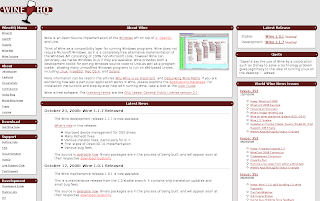
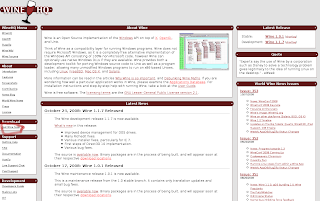
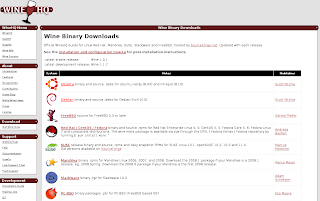
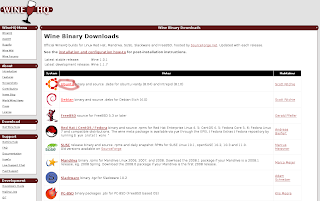
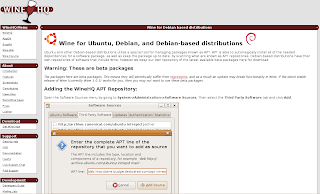

 Administration->Software Sources->Third Party Software" border="0">
Administration->Software Sources->Third Party Software" border="0">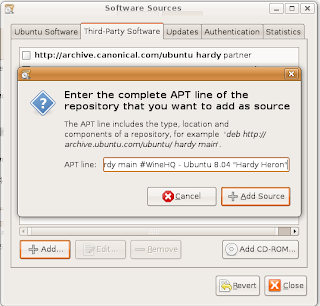
 Administration->Software Sources->Authentication" border="0">
Administration->Software Sources->Authentication" border="0">